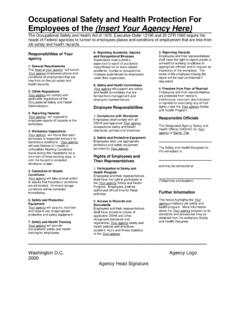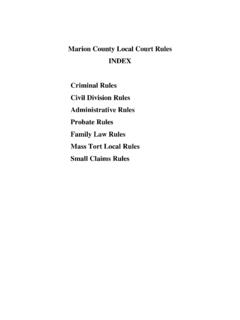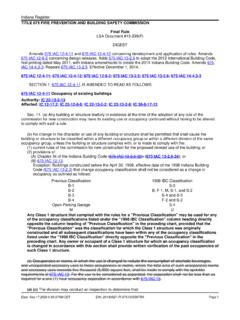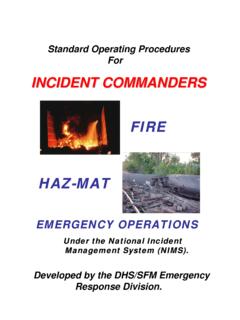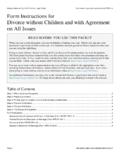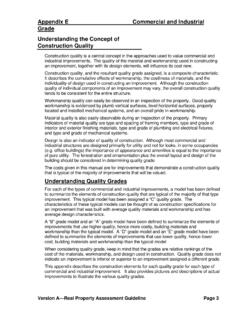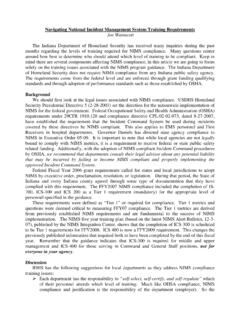Transcription of Wastewater Operator Certification Manual 08
1 Wastewater Operator Certification Manual Indiana Department of Environmental Management Office of water Quality Compliance Branch Updated February 2020 Wastewater Operator Certification Manual February 2020 Disclaimer This document, the Wastewater Operator Certification Manual , is compiled by the Indiana Department of Environmental Management (IDEM). Every effort has been made to ensure the accuracy and completeness of this Manual at the time of release. However, IDEM makes no guarantee that the Manual is completely free of errors or omissions. Please note that this Manual is intended solely as guidance for Wastewater operators; it is not intended to be a comprehensive reference.
2 Rather, it is intended to highlight various state guidelines and practices. It is ultimately the responsibility of the facility and its Operator to ensure that it complies with all applicable requirements. Owners, operators, and other responsible parties at the facility may wish to seek advice about the circumstances of their facility from independent environmental professionals before making compliance decisions. IDEM makes no warranties or representations, expressed or implied, that the use of any information, apparatus, method, or process discussed in this document will not infringe on privately owned rights. IDEM assumes no liability for damages resulting from the use of any information, apparatus, method, or process disclosed in this document.
3 The use of any name of a specific brand of products in this Manual is intended only as an example and is not an endorsement of that brand by IDEM and should not be construed as such. Liability Limitations The information compiled in this Manual is being provided by IDEM as a service to Indiana Wastewater operators. Every effort has been made to ensure the accuracy and completeness of this information. Neither IDEM nor any of its employees contributing to this publication can be held liable for any errors, omissions, or interpretations of regulations described herein. The rules and interpretation may change without individual notice to Wastewater operators. This Manual does not have the effect of law. Affected persons, including Wastewater operators, should use this Manual in conjunction with applicable laws.
4 This Manual does not replace applicable laws, and if it conflicts with these laws, the laws shall control. The Indiana Department of Environmental Management may revise, delete or supplement any information, policy, practice or procedure in this Manual at any time at its sole discretion. Section 1: IDEM Rules link 68 Section 2: Wastewater Laboratory QA/QC Manual 68 Section 3: Safety and Security 69 Wastewater Operator Certification Manual Table of Contents Page Chapter I About IDEM and the Office of water Quality 1 Chapter II - Indiana Wastewater Operator Certification Process Section 1: Operator Certification Program Overview 6 Section 2: Continuing Education Requirements 13 Section 3: Application Forms and Exam Book List 16 Chapter III Rules and Regulations Section 1: Rules: Exam Study Practice Questions 19 Section 2: Text of Rule 327 IAC 5-22; Classification of Wastewater Treatment Plants.
5 Examination and Certification of Operators 40 Section 3: IC 13-18-11: Operator Certification Statute 61 Chapter IV NPDES Permit Program and Wetlands Information 65 Chapter V Reporting Monitoring Report Forms 66 Includes MRO, MMR, CSO DMR, Bypass/Overflow and Non-Compliance forms Chapter VI Associated Topics for Wastewater Treatment Appendices Appendix A DMR/MRO Worksheet 72 Appendix B Sample NetDMR data entry page 74 Appendix C Sample MRO 75 Appendix D Sample NPDES permit page with limits 76 Appendix E Information on land application of biosolids 77 1 Chapter I: About IDEM and the Office of water Quality The mission of the Indiana Department of Environmental Management (IDEM) is to implement federal and state regulations to protect human health and the environment while allowing the environmentally sound operations of industrial, agricultural, commercial and governmental activities vital to a prosperous economy.
6 Environmental protection in Indiana has come a long way since 1986, when IDEM was established. Since then, IDEM has grown to a staff of over 800, and employs some of Indiana's most qualified engineers, scientists and environmental managers specializing in air, land, pollution prevention and water quality issues. Our staff members work hard to provide quality environmental oversight and technical assistance in your community and around the state. Whether you are a business owner, consultant, student, farmer, teacher or parent, IDEM is here to help you. ( ) The mission of IDEM s Office of water Quality (OWQ), under the oversight of the Assistant Commissioner of OWQ, is to concentrate on fulfilling IDEM s mission where water quality is concerned.
7 More specifically, OWQ is responsible for protecting public health and the environment by assessing the quality of surface water and groundwater through biological and chemical testing; regulating and monitoring drinking water supplies (including wellhead protection), Wastewater treatment facilities and the construction of such facilities; and, protecting wetlands for proper drainage, flood protection and wildlife habitat. OWQ serves the citizens of Indiana through fulfilling responsibilities as set forth in the Clean water Act. OWQ is divided into five branches for the implementation of its mission. The following is a description of the basic duties of each branch within the Office of water Quality. Compliance Branch: The Wastewater Compliance Branch ( ) in OWQ conducts inspections of facilities with NPDES and IWP permits, investigates complaints, provides Operator assistance and training, administers the Wastewater Operator Certification /continuing education program, administers the sewer ban and sewer ban early warning program, records compliance data into the federal ICIS database, reviews and evaluates compliance data, conducts informal enforcement actions through the issuance of noncompliance letters, refers the most serious violations for formal enforcement, and assists in the enforcement process.
8 The Compliance Branch is also responsible for assuring Wastewater laboratory proficiency and data integrity. Compliance Branch staff are responsible for implementing the state pretreatment program rules and working with EPA Region 5 to administer the national pretreatment requirements in Indiana. Information on reported bypass and overflow events is collected and recorded, so that these discharges can be evaluated for further agency action. Compliance Data Section 2 Compliance Data staff are responsible for assuring that DMRs are submitted and recorded in the ICIS database. They also provide assistance in preparing/submitting DMRs and in assuring that reported permit violations are addressed. Wastewater Inspections Inspections are conducted without prior notification, in order for the inspector to see normal operating conditions, with no opportunity for facility staff to fine tune or spruce up for a visit.
9 So what does an inspector want to see during an inspection? The NPDES permit for each Wastewater facility specifies effluent limitations and other conditions that must be met to minimize the discharge of pollutants to the waterway. During an inspection the inspector will conduct a walk-through of the facility to determine the adequacy of the operation and maintenance practices and will review facility records. The self-monitoring program for each plant is the foundation for proper evaluation of facility compliance. All monitoring records must be kept on site for a minimum of three years. Monitoring records that may be reviewed include state reports, sampling reports, lab bench sheets, chain of custody sheets, Operator log sheets, flow measurement records, calibration records, industrial user records and other miscellaneous reports.
10 These reports and records must be clear, concise, and include all information required by the NPDES permit. The inspector will determine whether data included on the reports is accurate and representative. This will include examination of lab procedures and equipment, sampling procedures and equipment, on-line monitoring instruments, and operation and maintenance procedures of all pumps, treatment units and other equipment. Laboratory Assistance Laboratory technical assistance is provided to operators by phone and on-site. Laboratory technical assistance staff also oversees the EPA DMRQA and operations and maintenance award programs. For additional guidance, the QA/QC Manual for Wastewater Laboratories can be found at Operation Assistance Technical staff provides on-site, hands-on assistance in the proper operation of Wastewater plants.
